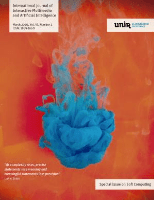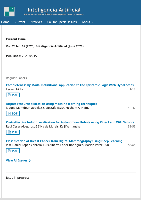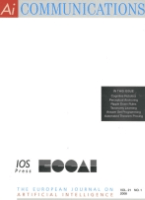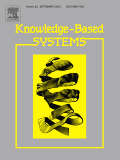
AI MAGAZINE
Scope & Guideline
Bridging Theory and Application in AI Research.
Introduction
Aims and Scopes
- Interdisciplinary applications of AI:
The journal covers a wide range of applications of AI, including but not limited to healthcare, agriculture, education, and journalism. This interdisciplinary approach allows for innovative solutions to complex problems. - Focus on ethics and fairness in AI:
AI Magazine emphasizes the importance of ethical considerations in AI development, including fairness, accountability, and transparency. This focus is essential as AI systems increasingly impact societal decision-making. - Advancements in AI methodologies:
The journal publishes research on cutting-edge AI methodologies, including machine learning, reinforcement learning, and optimization techniques, which are crucial for developing sophisticated AI systems. - Human-AI interaction and collaboration:
A significant area of focus is on improving human-AI interaction, exploring how AI can assist and augment human capabilities, particularly in decision-making and creative processes. - Trustworthy AI systems:
AI Magazine is dedicated to discussing the development of reliable and explainable AI systems that can be trusted in critical applications, ensuring safety and efficacy.
Trending and Emerging
- AI for social good:
There is a growing emphasis on using AI technologies to address societal challenges, such as healthcare access, climate change, and misinformation, showcasing the potential of AI to positively impact communities. - Explainable AI (XAI):
Research focused on developing explainable AI systems is on the rise, as stakeholders demand transparency and interpretability in AI models to build trust and ensure responsible deployment. - Collaborative and human-centered AI:
The trend towards designing AI systems that work collaboratively with humans, enhancing human capabilities instead of replacing them, is gaining momentum, especially in fields like education and healthcare. - Regulatory and governance frameworks for AI:
With the increasing complexity of AI systems, there is a heightened focus on establishing guidelines and frameworks for ethical AI use, including discussions around regulations like the EU AI Act. - Generative AI and creative applications:
The exploration of generative AI technologies, particularly in creative fields such as journalism and art, is emerging as a significant area of interest, reflecting the transformative potential of AI in creative processes.
Declining or Waning
- Traditional AI methods:
Research based on classical AI methodologies, such as rule-based systems and early machine learning techniques, has decreased as newer approaches like deep learning and reinforcement learning gain traction. - Narrowly focused AI applications:
There has been a noticeable decline in papers that exclusively focus on niche applications of AI without broader implications or interdisciplinary relevance, as the journal seeks to emphasize more integrative and impactful studies. - Theoretical discussions without practical implications:
Papers that emphasize theoretical aspects of AI without connecting to real-world applications or implications are becoming less prevalent, as the journal prioritizes research that demonstrates practical utility. - Overly technical analyses:
There is a reduction in highly technical analyses that do not consider ethical, societal, or interdisciplinary aspects, as the journal aims to make AI research more accessible and relevant to a broader audience.
Similar Journals

International Journal of Interactive Multimedia and Artificial Intelligence
Fostering Global Insights in AI and MultimediaThe International Journal of Interactive Multimedia and Artificial Intelligence, published by UNIV INT RIOJA-UNIR in Spain, is a leading Open Access journal that has been fostering knowledge dissemination in the field since 2008. With an ISSN of 1989-1660 and an impressive impact characterized by its Q1 and Q2 rankings across major categories in Artificial Intelligence and Computer Science, the journal serves as a crucial platform for researchers and professionals eager to explore innovative applications and technological advancements. This journal is particularly distinguished by its commitment to high-quality peer-reviewed research, evident in its current Scopus rankings, which place it among the top percentile in various computer science domains, including Statistics, Signal Processing, and Computer Vision. The journal's scope encompasses a wide array of topics that intersect with multimedia and artificial intelligence, making it an invaluable resource for students and emerging scholars aiming to deepen their understanding and contribute to these vibrant fields. Through its Open Access model, it ensures that research is accessible to a global audience, thus enhancing the visibility and impact of the scientific discourse.

Inteligencia Artificial-Iberoamerical Journal of Artificial Intelligence
Connecting Minds Through Open Access Scholarship.Inteligencia Artificial-Iberoamerican Journal of Artificial Intelligence, published by the ASOC ESPANOLA INTELIGENCIA ARTIFICIAL, serves as a pivotal platform for disseminating cutting-edge research in the burgeoning fields of artificial intelligence and software development. Established in 1997 as an Open Access journal, it ensures broad accessibility to its scholarly content, thus fostering collaboration and knowledge exchange amongst researchers, professionals, and students across the globe. Based in Valencia, Spain, the journal currently operates within a significant timeline spanning from 2004 to 2010 and 2012 to 2024, enabling continual contributions to the academic discourse. Although it holds a Q4 quartile ranking in both the Artificial Intelligence and Software categories and a notable yet competitive Scopus ranking among its peers, the journal remains committed to advancing the understanding and application of sophisticated AI methodologies. As it continues to embrace innovative research, this journal stands as a crucial reference point for those keenly navigating the complexities of artificial intelligence in a rapidly evolving digital landscape.

Intelligenza Artificiale
Unveiling the Future of Intelligent SystemsIntelligenza Artificiale is a prominent academic journal dedicated to advancing the field of artificial intelligence, published by IOS PRESS, a renowned publisher in the scientific community. Based in the Netherlands, this journal's ISSN is 1724-8035 and its E-ISSN is 2211-0097. With a current impact factor that reflects its relevance in the scholarly landscape, it operates in the Q2 quartile of the Artificial Intelligence category as of 2023, which ranks it notably at #200 out of 350 within its field according to Scopus data. The journal provides a valuable platform for researchers, professionals, and students to disseminate and access cutting-edge findings from 2018 to 2024, focusing on the innovative applications and theoretical developments in artificial intelligence. With its commitment to fostering academic dialogue and collaboration, Intelligenza Artificiale is essential for anyone looking to stay at the forefront of AI research and practice.

AI COMMUNICATIONS
Bridging Research and Real-World AI Applications.AI COMMUNICATIONS is a distinguished journal published by IOS PRESS, focusing on the dynamic field of Artificial Intelligence. With a rich history dating back to 1987, this journal covers a broad spectrum of topics, including the latest advancements in AI methodologies, applications, and implications for society. Despite holding a Q3 classification in the 2023 category of Artificial Intelligence, it provides an essential platform for dialogue and dissemination of research, highlighted by its global accessibility in the realm of AI communications. Researchers, professionals, and students alike will find a wealth of knowledge within its pages, which aim to bridge the gap between cutting-edge research and practical applications in AI. By contributing to this journal, authors have the potential to engage with a diverse audience and impact the ongoing discourse surrounding artificial intelligence technologies.

MINDS AND MACHINES
Navigating the Complexities of Mind and MachineMINDS AND MACHINES is a distinguished peer-reviewed journal published by Springer, specializing in the interdisciplinary realms of Artificial Intelligence and Philosophy. Founded in 1991, this journal continues to serve as a critical forum for exploring the intricate relationships between human cognition, artificial systems, and ethical considerations in technology. With an impressive impact factor positioned in the Q1 quartile for both the fields of Artificial Intelligence and Philosophy, MINDS AND MACHINES ranks as a top-tier publication, reflecting its significant contributions to ongoing scholarly discussions. The journal is indexed in Scopus, where it holds the number one rank in Philosophy within the Arts and Humanities category, and the 42nd position in the Computer Science segment for Artificial Intelligence, demonstrating its wide-reaching influence and high citation impact. Although it does not offer open access, its rigorous selection process ensures that only high-quality manuscripts are published, making it an essential read for researchers, professionals, and students aiming to stay at the forefront of developments in these rapidly evolving fields.

KNOWLEDGE-BASED SYSTEMS
Advancing the Frontier of Intelligent SystemsKNOWLEDGE-BASED SYSTEMS, published by ELSEVIER, is a leading international journal that has established itself as a cornerstone in the fields of Artificial Intelligence, Information Systems and Management, and Software Development. With an impressive track record of over 35 years in publication, this journal is highly regarded for its significant contributions to the understanding and advancement of intelligent systems, providing a platform for innovative research and applications. It boasts a strong impact factor, maintaining a Q1 ranking across multiple categories, including Management Information Systems and Decision Sciences, reflecting its prestige and relevance in the academic community. Researchers and practitioners alike benefit from access to high-quality, peer-reviewed articles that explore the intersection of knowledge management and transformative technologies. The journal's commitment to fostering interdisciplinary research encourages the dissemination of knowledge that shapes the future of intelligent decision-making processes. With a substantial audience that includes professionals, academics, and students, KNOWLEDGE-BASED SYSTEMS continues to be a vital resource for those at the frontier of technological advancement.

JOURNAL OF INTELLIGENT INFORMATION SYSTEMS
Shaping the Future of Intelligent Systems ResearchThe Journal of Intelligent Information Systems, published by Springer since 1992, is a premier academic journal that offers a multidisciplinary platform in the fields of Artificial Intelligence, Computer Networks and Communications, Hardware and Architecture, Information Systems, and Software. With an impressive impact reflected in its 2023 Q2 category rankings across multiple domains and a commendable standing in the Scopus Rankings—ranking #84 in Computer Networks and Communications and #101 in Artificial Intelligence—the journal is recognized for its contribution to advancing knowledge and innovation. Although it is not an open-access journal, its accessibility through institutional subscriptions ensures that a wide range of researchers, professionals, and students can engage with high-quality, peer-reviewed research that addresses the latest advancements and trends in intelligent systems. For over three decades, this journal has effectively bridged gaps between academia and industry, making it a vital resource for those aiming to push boundaries in intelligent information systems.

International Journal of Artificial Intelligence in Education
Advancing AI's Role in Transformative EducationInternational Journal of Artificial Intelligence in Education, published by SPRINGER, stands at the forefront of research in the interdisciplinary fields of artificial intelligence, education, and e-learning. With an impact factor that reflects its prestigious standing, this journal is categorized in the Q1 quartile for both Computational Theory and Mathematics and Education, as well as E-learning, making it an essential resource for scholars and practitioners alike. Founded in 2000, this journal not only disseminates cutting-edge research but also facilitates critical discussions on the implications of AI technologies in educational contexts. Featuring a robust Scopus rank within the top percentile for relevant fields, thereby highlighting its influence and reach, the journal provides a platform for innovative findings that shape the future of teaching and learning. Researchers and educators interested in advancing the integration of AI into educational systems will find this journal a vital source of knowledge and insight.

International Journal of Semantic Computing
Advancing the Frontier of Semantic TechnologiesThe International Journal of Semantic Computing is a premier scholarly publication focused on the intersection of artificial intelligence, computer networks, and linguistics, published by World Scientific Publishing Co PTE Ltd. Since its inception in 2007, this journal has strived to advance the field of semantic computing by promoting innovative research and interdisciplinary collaboration among professionals and academics. With a diverse scope that spans across various categories including Artificial Intelligence, Information Systems, and Linguistics, it boasts commendable rankings, particularly in the fields of Linguistics (77th Percentile) and Linguistics and Language (Rank #259/1167). The journal caters to a broad audience by offering critical insights and cutting-edge studies, thereby contributing significantly to knowledge enhancement in semantic technologies and computational linguistics. Although it does not offer open access options, its rigorous peer-review process ensures the publication of high-quality research that is invaluable for both researchers and students seeking to deepen their understanding in these rapidly evolving areas.

IEEE Computational Intelligence Magazine
Unveiling Insights in Machine Learning and Data MiningIEEE Computational Intelligence Magazine, published by the esteemed IEEE-INST ELECTRICAL ELECTRONICS ENGINEERS INC, is an essential resource for researchers and professionals in the fields of Artificial Intelligence and Theoretical Computer Science. With a robust Q1 ranking in both categories for 2023, this magazine stands out as a leader in disseminating cutting-edge research and innovative applications within computational intelligence. As an invaluable conduit for knowledge, it covers a diverse range of topics, including but not limited to machine learning, neural networks, and data mining. The magazine is particularly recognized for its interdisciplinary approach, bridging gaps between theory and application while contributing to advancements in technology and society. Although it does not offer open access, the insights provided are critical for staying at the forefront of this rapidly evolving discipline. Join a community of like-minded scholars and practitioners by exploring the latest findings and trends published from 2006 to 2024, operating from its headquarters at 445 Hoes Lane, Piscataway, NJ, United States.